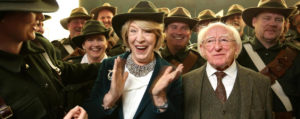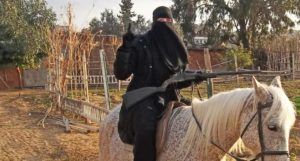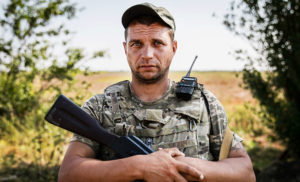How many of Ukraine’s priests are working for Putin? The nation’s security services are determined to find out. Last month, the SBU raided a 1,000-year-old Orthodox Christian monastery in Kyiv looking for Russian citizens, cash, and pro-Russian literature. Priests at the Pechersk Lavra complex were hooked up to lie detectors and grilled for information. Officers searched for signs of undocumented Russian saboteurs.
The raid was part of a wider operation, aimed at countering suspected “subversive activities by Russian special services” in Orthodox churches. More than 350 buildings have been searched and 850 people questioned across Ukraine, from Rivne in the West to Odesa in the South. “We have to create conditions where no actors dependent on the aggressor state will have an opportunity to manipulate Ukrainians and weaken Ukraine from within,” President Zelenskyy said last Thursday. “We will never allow anyone to build an empire inside the Ukrainian soul.”
The Ukrainian Orthodox church formally split from Russia’s in 2019, but some churches and monasteries have remained loyal to Moscow — including Pechersk Lavra, previously the headquarters of the Russian-backed wing of the Ukrainian Orthodox church. Oleksandr, an SBU agent who attended the raid in Kyiv, tells me it was triggered by a video that showed churchgoers singing songs about the “Russian World” and celebrating the “awakening” of Russia. “A normal guy went to Pechersk Lavra to pray,” explains Oleksandr. “He started to notice how odd things are: the priest is openly supporting Russia; the congregation are singing songs praising Russia. He’s in shock so begins to film the scene. That’s what prompted this group of raids, but we have been aware of these churches for a long time.” But the SBU had to wait several months before launching any raids, so politically sensitive was the issue.
“We knew they were used to stash weapons and money, but even we were surprised by the amount of money we found,” he continued. “At the monastery in Sarny in Rivne we found many foreign currencies along with two million Ukrainian hryvnia. We also found a large amount of gold jewellery — crosses to be specific.”
Likewise, according to the SBU website, more than $100,000 in cash was found during the raids, along with pro-Russian literature and “likely citizens of the Russian federation”. SBU believes the money was used to pay pro-Russian locals for information helpful to Putin’s army.
Meanwhile, in the town of Vinnytsia, 260km south-west of Kyiv, an investigation is being carried out into the role of the church in preparing young people to fight for Russia in eastern Ukraine. Security sources claim that churches were used to cache weapons to help those who wished to act as saboteurs for Russia.
Ukraine’s operations on Russian loyalist churches have infuriated Moscow, with Kremlin spokesperson Dimitry Peshkov describing them as “waging a war on the Russian Orthodox Church”. Yet it is the Orthodox church that has helped Putin wage war on Ukraine. Since the liberation of occupied areas, shocking details have come to light. Those living in formerly occupied regions claim that priests paid locals sympathetic to Moscow for coordinates of potential targets and for the locations and movements of Ukrainian troops. They also claim that priests bribed corrupt local officials in the run-up to the Russian invasion.
This is not a new phenomenon. For years, the Orthodox church has been recruiting Russian sympathisers in eastern Ukraine. In Kyiv, Daniil, a 29-year-old lawyer from Lugansk — who asked that we do not use his surname as he still has family in the occupied region — said religious lessons were introduced in the east back in 2010. “They used this church to try and, I guess you’d say, radicalise people for Russia,” he said. “We had religious classes they wanted us to attend. The idea was they would fully integrate us to this propaganda, the perfect Russian society with its wonderful anti-Western morals. It was crazy. I never went.” Young people never did.
The church’s influence even extends to the battlefield. Russia, like so many invaders before it, claims to have God on its side. On a visit to the frontline in Donetsk in 2016, I saw icons being paraded around to freezing separatist soldiers in the trenches. (“I’d rather they brought bread,” one of them said after spending several seconds kissing the icon.) But it was never just about winning hearts and minds. Former FSB agent Igor Girkin — who last month was sentenced in the Hague to life in prison for shooting down Malaysian Airlines flight MH17 in Ukraine — described the monks from Sviatohirsk Lavra monastery as his “personal security” during his time commanding separatists in Donetsk in 2014. Many monks during that time were actively engaged in fighting.
The Russian church in Ukraine is not only helping to fight Putin’s war. It also plays a crucial part in Putin’s foreign policy, outlined in a 31-page “humanitarian policy” published last September, to create a “Russian World”: a region driven by Russian language, culture, and orthodoxy. The idea is to present Russia as the custodian of tradition, a fiery opponent to the soft, morally bankrupt West with its focus on gay rights and feminism. Here, conservative religious values are justification for Russian expansionism in Georgia, Ukraine and the Baltic States.
But Ukraine’s church has fought hard to free itself from the “Russian World”. In 1992, the Orthodox Church of Ukraine (OCU) was established as a new challenger to the historically Russian-affiliated church. And in 2018, the OCU requested full independence from the head of the global Orthodox Church, Patriarch Bartholomew of Constantinople. After several rejections, a final push from the former Ukrainian president Petro Poroshenko convinced the Patriarch that Ukraine’s church could indeed be free.
The separation infuriated Russia. An obedient Ukrainian congregation was central to its strategy for the “Russian World”. Two months after Russia’s February invasion, Ukraine’s pro-Russian church issued a statement describing the split as “one of the reasons” for the Kremlin’s latest invasion, and criticising “the erroneous religious policy of the presidency of P.O. Poroshenko and the destructive ideology of the so-called Orthodox Church of Ukraine”.
The OCU remains defiant, however. This year, many Ukrainian churches plan to celebrate Christmas on 25 December for the first time, in an act of protest. This is a radical move away from Russia and towards the West, given that most Orthodox churches celebrate Christmas on 7 January.
The war has cratered the Russian-backed church’s popularity. A 2020 survey by the Razumkov Centre found that 34% of Ukrainians were members of the main Orthodox church, while only 14% were members of Moscow’s patriarchate church. Since the Russian annexation of Crimea, Donetsk and Lugansk, many in the country have turned their back on the latter. Church attendance plummeted following the launch of Russia’s special “denazifying” military operation in Ukraine. “People become a bit more religious during war,” Daniil told me in Kyiv. “But I don’t think anyone would go to that church now — it’s a poison.”
“The Russian Church isn’t helping people here, they’re just creating problems,” says Andrii Tsarenko, a 21-year-old theology student and devout Baptist from Kharkiv, who I met on an overnight train. “The rules of Orthodox Churches are like corporations that stake out territory. It’s like Pepsi and Coca-Cola. Pepsi gets a slice of territory and Coca-Cola has theirs. The problem in Ukraine is the Russian Orthodox Church thinks Ukraine is its territory.”
The Church, instead of offering comfort, is seen as a relic of a time when Ukraine served Russia. As the country’s young people look forward to a pro-Western future, they reject the “Russian world” and its ideology. Like the SBU, whose raids are ongoing, they see the Church as just another arm of the Kremlin’s hybrid model of war. For Andrii, who remained in his native Kharkiv during the worst days of fighting, it has no place in modern Ukraine.
“They abandoned all their buildings when the Russians came. We had to take care of their congregation. They are aggressors attacking us because of the desires of one man. There is nothing Christian about their actions.”
***
Order your copy of UnHerd’s first print edition here.
Disclaimer
Some of the posts we share are controversial and we do not necessarily agree with them in the whole extend. Sometimes we agree with the content or part of it but we do not agree with the narration or language. Nevertheless we find them somehow interesting, valuable and/or informative or we share them, because we strongly believe in freedom of speech, free press and journalism. We strongly encourage you to have a critical approach to all the content, do your own research and analysis to build your own opinion.
We would be glad to have your feedback.
Source: UnHerd Read the original article here: https://unherd.com/





